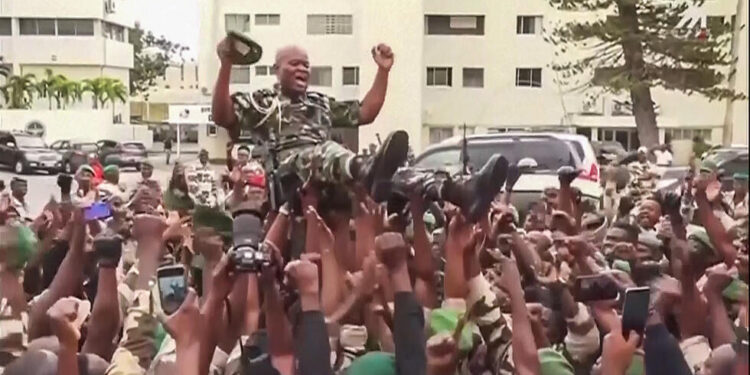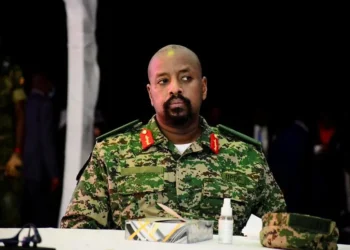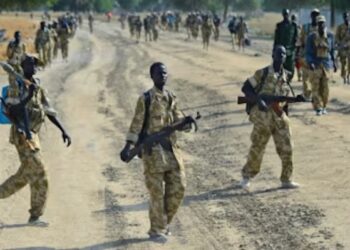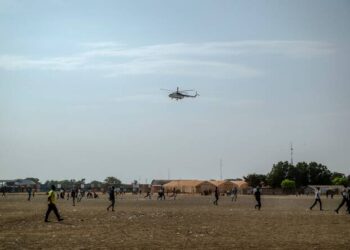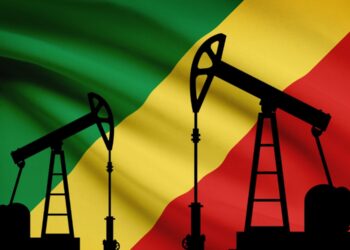Army officers who seized power in a coup in Gabon on Wednesday have named General Brice Oligui Nguema as the country’s transitional leader.
Gen Nguema was earlier carried triumphally through the streets of the capital Libreville by his troops.
The deposed President, Ali Bongo, has appeared in a video at his home, calling on his “friends all over the world” to “make noise” on his behalf.
The former French colony is one of Africa’s major oil producers.
Mr Bongo’s overthrow ended his family’s 55-year hold on power in the Central African state.
Army officers appeared on TV in the early hours of Wednesday to say they had taken power.
They said they had annulled the results of Saturday’s election in which Mr Bongo was declared the winner but which the opposition said was fraudulent.
The officers also said they had arrested one of Mr Bongo’s sons for treason.
Within hours, generals met to discuss who would lead the transition and agreed by a unanimous vote to appoint Gen Nguema, former head of the presidential guard.
Gen Nguema told France’s Le Monde newspaper that Gabonese people had had enough of Ali Bongo’s rule, and that he should not have run for a third term.
“Everyone talks about this but no one takes responsibility,” he said. “So the army decided to turn the page.”
Crowds in Libreville and elsewhere celebrated the army’s declaration.
There has long been simmering resentment of the Bongo family – it ruled Gabon for almost 56 years – and there has been public discontent over broader issues such as the cost of living.
“At first I was scared, but then I felt joy,” a resident of Libreville, who requested anonymity, told the BBC. “I was scared because of the realisation that I am living through a coup, but the joy is because we’ve been waiting for so long for this regime to be overthrown.”
African leaders work on response
African leaders were working on a response on Thursday to officers in Gabon who ousted President Ali Bongo and installed a general as head of state, the latest in a wave of coups in West and Central Africa that regional powers have failed to reverse.
The takeover ends the Bongo family dynasty’s almost six decades in power and creates a new conundrum for a region that has struggled to deal with eight coups since 2020. Nigeria’s recently elected president called it a “contagion of autocracy”.
Central Africa’s political bloc, the Economic Community of Central African States (ECCAS), condemned the coup in a statement, saying it planned an “imminent” meeting of heads of state to determine how to respond. It did not give a date.
The African Union’s Peace and Security Council will meet on Thursday to discuss the coup, a spokesperson for the African Union Commission chair said.
Nigerian President Bola Tinubu, who was sworn into office in May and now chairs the West African bloc ECOWAS, said on Wednesday he was working closely with other African leaders to contain what he called a “contagion of autocracy” spreading across Africa.
The events follow coups in the past four years in Mali, Guinea, Burkina Faso, Chad and Niger, erasing democratic gains since the 1990s and raising concerns among foreign powers with regional strategic interests. The coups also showed the limited leverage of African powers once the military takes over.
ECOWAS threatened military intervention in Niger after a coup there on July 26 and imposed sanctions, but the junta has not backed down. Military leaders elsewhere have also resisted international pressure, such as in Mali. They have managed to hold on to power and some have even gained popular support.
Hundreds of people took to the streets of the capital Libreville to celebrate Wednesday’s coup in Gabon. The city was calmer on Thursday as people returned to work, although the main intersections and throughfares were guarded by security forces.
Bongo’s popularity had worn thin amid claims of corruption, sham elections and a failure to spend more of Gabon’s oil and mineral wealth on the country’s poor. He took over in 2009 on the death of his father Omar, who had ruled since 1967.
The African Union, former colonial power France, the United States, Canada and Britain have all expressed concern about the coup. But they have not made direct calls for reinstating Bongo.
The European Union’s foreign policy chief Josep Borrell said the election had been full of irregularities, while adding that the EU rejected the seizure of power by force.
“The challenges facing Gabon must be resolved in accordance with the principles of the rule of law, constitutional order and democracy,” he said.
A lack of international observers, the suspension of some foreign broadcasts, and the authorities’ decision to cut internet service and impose a nighttime curfew after the poll raised concerns about the transparency of the vote.















































